
13 Oct The facts of vaccinating our kids against COVID-19
To safely emerge from lockdowns, limit future lockdowns and return to a semblance of normality vaccinating adolescents will be important, writes Professor Nathan Grills
By and large adults have rolled up their sleeves. They have examined the evidence on vaccines, rationally weighed up the risks and benefits, and got themselves jabbed.
Vaccinating eligible children will now be the leading conversation topic between socially distanced (and vaccinated) parents at playgrounds and picnics. Does the benefit of vaccinating my year 7 child outweigh the risk?
This is a very reasonable question given the risk-benefit equation is perhaps less clear. Kids rarely die from COVID-19 and we hear of rare (albeit minor) side effects. But the answer remains ‘yes’.
If the Australian Technical Advisory Group on Immunisation (ATAGI) and the Therapeutic Goods Administration – who were perhaps overly cautious with advice on the very safe AstraZeneca vaccine – approve and advise Pfizer for 12 to 15-year-olds, then that’s enough for me. These expert groups are independent, science-based and apply rigorous standards for approvals.
Now there’s the news out of the US that Pfizer and BioNTech say their studies show the coronavirus vaccine is safe for children aged between five and 11. So, I’ll also accept any future ATAGI recommendations and vaccinate my nine and ten year old when they are eligible.
However, let’s look at it ourselves and weigh the risks and benefits.
The risk? Most reassuringly, of the millions of children vaccinated with Pfizer in America, none have died. In fact, worldwide I’m not aware of any deaths of children attributable to COVID-19 vaccinations.
Further, the serious side effects from the 750 million Pfizer adult doses given globally have been exceedingly rare and transient. And it’s reasonable to expect similar adverse reactions in children.
After all, it’s the same vaccine and it works the same way.

But perhaps the incidence of certain adverse events might vary. And that’s what we are seeing (rarely) in younger people, especially males, who are more likely to experience pericarditis or myocarditis after Pfizer.
Let’s look at vaccinating – or not vaccinating – an entire year level in Victoria.
If all 70,000 Year 7s in Victoria were vaccinated with Pfizer, we’d expect around 2.5 cases of pericarditis or myocarditis in males (the current rate is 0.008 per cent). But it’s not a heart attack. Pericarditis is usually minor and healthy children nearly always fully recover. Most cases can be largely treated at home with anti-inflammatory drugs and GP monitoring.
Conversely, we know that myocarditis and pericarditis are much more common and progressive with COVID-19 infection and damage to the heart occurs frequently after infection.
But what if my child has Postural Orthostatic Tachycardia Syndrome, an immune issue or a serious life-threatening condition? Well, they need priority immunisation.
These children do not have any higher likelihood of getting pericarditis from Pfizer, but they do have a much higher likelihood of death from COVID-19. Of a small number of children who died from COVID-19 in the UK, the majority had serious comorbidities.
What about the expected benefit to those 70,000 children in Year 7 that I mentioned earlier?

Firstly, our children already ‘happily’ receive around 18 jabs before turning 18. All but a handful of anti-vaxxers accept these jabs based on sound medical advice.
Vaccines are safe and effective and have made death and disability from diseases like diphtheria, polio paralysis and tetanus very rare in Australia. The same can’t be said for some poorer countries.
And studies on Pfizer’s effectiveness in children indicate Pfizer is safe and could prevent most infections and nearly all deaths in children. And while no child has died from the Pfizer vaccine, some 439 children have died from COVID-19 in the USA.
If all Year 7 parents refused to allow their kids to be vaccinated then, over time, let’s assume 70 per cent (or 50,000) of them would be infected. This could lead to more than 1000 cases of long term symptoms or long COVID (a rate of two per cent).
And extrapolating from our current Australian data, if 50,000 adolescents were diagnosed with COVID-19, we might expect 1400 of them to be hospitalised (the current rate of 2.9 per cent) and some of them requiring intensive care (the current rate of 0.6 per cent).
But let’s zoom out, as the benefit goes well beyond our group of Year 7s.
When weighing up vaccines, we need to go beyond the individual risk-benefit. That’s the case with many other childhood vaccines which are also intended to protect society in addition to the individual child.
Vaccinating children against COVID-19 reduces the risk to society, to the vulnerable, and, particular, to the elderly.
Yes, your child is less vulnerable to COVID-19 than adults. But children can still get infected and pass it on to parents and grandparents who have much higher risks from infection.
I just lost a good friend to COVID-19 due to this transmission pathway – she contracted COVID from her unvaccinated daughter.
Furthermore, when children get vaccinated against COVID-19 they contribute to the health of society more widely – by reducing transmission and allowing safer reopening.
The cost of remaining closed is growing – especially for children’s education. But, the Delta variant is infecting higher numbers of children and when schools reopen, as they soon must, childhood infections could derail the roadmap.
So, vaccinating eligible children will improve the likelihood of us all staying on track to ‘normality’.
Part of the solution to this pandemic is in our hands (or in our arms). As parents, we need to get vaccinated. And I will also be vaccinating my children to protect them and our community.
Professor Nathan Grills is a Public Health Physician and NHMRC Post Doctoral Fellow, Nossal Institute for Global Health, University of Melbourne; Senior Research Advisor, Australia India Institute.
This article was first published on Pursuit. Read the original article.
A version of the article was also published in the Herald Sun. Banner: Getty Images
More Information: watch Keeping the Kids in Mind: COVID vaccines for children and youth COVID vaccines in children and youth: A review of the safety and evidence for use for parents, with A/Prof Nicholas Wood, Senior Lecturer in paediatrics and child health, Children’s Hospital Westmead

